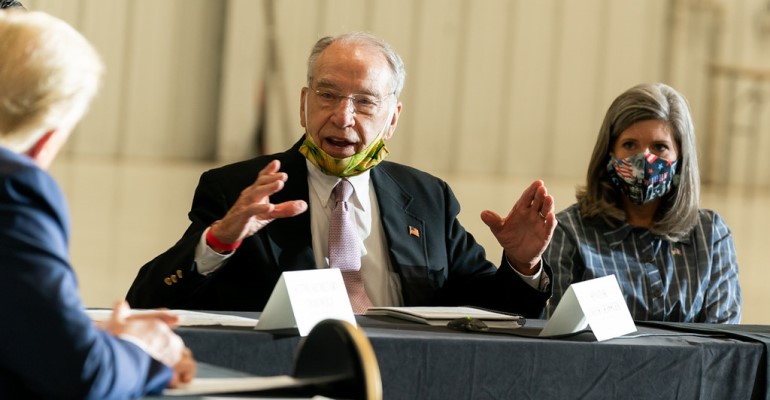Trump Administration still missing mark on biofuels
Calls getting louder to deny small refinery exemptions, but is President willing to take action?

It was nearly a year ago when farmers' cries started getting louder demanding that President Donald Trump and his Administration stand up for the Renewable Fuel Standard (RFS) and defend the interests of biofuels over big oil. Fast forward to today, and the biofuel industry has been struck with not only an extreme drop in fuel demand in 2020 but also ongoing uncertainty over the RFS.
Vice President Mike Pence was in Iowa Aug. 13 to relaunch the Farmers & Ranchers for Trump coalition. He was also scheduled to speak at Heritage Action in Des Moines on the same day, although probably not about ethanol, since Heritage leads efforts to end Iowa biofuels, and ExxonMobil is one of the largest donors to Heritage.
The Iowa Renewable Fuels Assn. (IRFA) said its members were “more than a little shocked and frustrated” that during his time in Iowa, the nation’s largest producer of ethanol and biodiesel, Pence would meet with the prominent anti-RFS group when so many issues facing renewable fuels remain unresolved.
“Heritage Action no doubt promotes several laudable issues, but their long-standing and outspoken opposition to the RFS makes the elevation of their platform in the state of Iowa concerning as rural Iowans continue to wait for action from the Trump Administration on a number of key priorities,” IRFA said.
Iowa Soybean Assn. president Tim Bardole, who farms 2,500 acres of corn and soybeans near Rippey, Iowa, said in a private meeting with Sen. Joni Ernst (R., Iowa) and the Vice President prior to his speech with Iowa leaders, Pence seemed unaware of what was going on with the small refinery waivers when he turned to Ernst and asked, “Didn’t we take care of this?”
Currently, the Environmental Protection Agency is considering 58 small refinery waivers for years that go back before a 10th Circuit Court ruling was in effect. Bardole said Pence, during their discussion, definitely implied that the Administration would deal with it, and “hopefully that means they won’t be approved.”
Lance Lillibridge, a farmer in Vinton, Iowa, said if the Administration were to take action on the small refinery exemptions before the presidential election this fall, “they would have a whole bunch more votes in Iowa.”
However, Trump's handling of the ethanol issues may have already caused his former supporters to look elsewhere this fall. Reports indicate that Trump plans to wait to release RFS volume obligations until after November because he can’t make both the ethanol and petroleum industries happy.
During his briefing on the derecho storm impacts in Iowa on Aug. 18, Trump heard about farmers' need for growing and reliable markets from proper implementation of the RFS. Ernst made it clear that Iowa farmers are waiting to see EPA deny gap-year requests for RFS exemptions.
“One thing that would be helpful, of course, with the impact to the ag economy, the loss of so many crops, is our farmers would love to know with these gap-year waivers that the oil refineries are submitting to the EPA that we just dispense of those -- we not allow them to move forward. Some of these waivers would apply to nine years ago, eight years ago. Our farmers just really need some help this year, obviously with the crop damage, and that would be a great step forward,” Ernst told Trump.
She added, “What we need, just help from the EPA to follow the intent of the law with the Renewable Fuels Standard.”
Trump responded, “Alright. We’ll speak to [EPA]. I’ll speak to them myself. I’ll do it myself.” His statement stopped short of promising to deny the waivers, however.
IRFA executive director Monte Shaw said, “We're pleased the President has committed to talking with EPA. Now, rural Iowans wait to see if Trump orders EPA to deny the baseless and illegal RFS waivers or be stonewalled by his own Administration. Iowa is watching."
Ahead of the visit, IRFA joined the Iowa Corn Growers Assn., the Iowa Soybean Assn. and the Iowa Biodiesel Board in sending an open letter to Trump thanking him for the derecho disaster assistance but beseeching him to take steps to create stable and growing markets through a robustly implemented RFS that rural Iowa needs to fully recover from the recent storm and other economic blows.
“Mr. President, you have the power to immediately end the frustration of farmers related to biofuels and to remove all doubt of your commitment to the RFS. Please order EPA Administrator [Andrew] Wheeler to reject all of the nearly 60 new baseless RFS exemption petitions and to apply the 10th Circuit decision to all pending RFS refinery exemption requests,” the letter stated. “Uphold the integrity of the law by enforcing that 15 billion gal. of corn ethanol means corn ethanol, or remove the cap for corn altogether so that farmers have access to the market for clean-burning, homegrown fuels.”
The groups' letter stated, “Make no mistake, these issues are being discussed daily around the state, and it is often reported back to us that Iowans are saying: ‘If we can’t trust the Trump Administration to do the right thing before the election, then why on Earth would we expect them to treat us fairly after the election?’”
As I said in a blog I wrote nearly a year ago, Trump has an undeniable sweet spot for farmers and the ethanol industry. However, he has got to figure out if he can stop the bleeding that continues in the countryside due to EPA’s actions related to ethanol and corn demand.
About the Author(s)
You May Also Like





